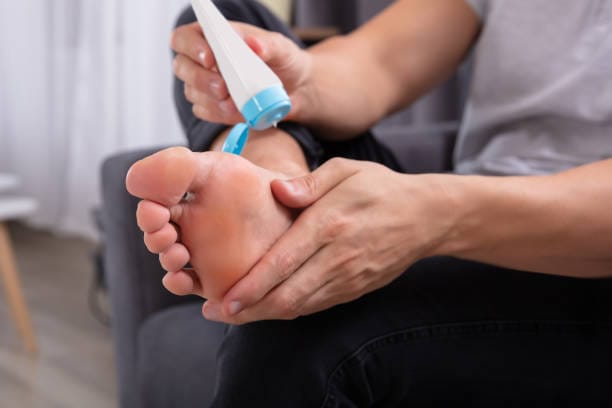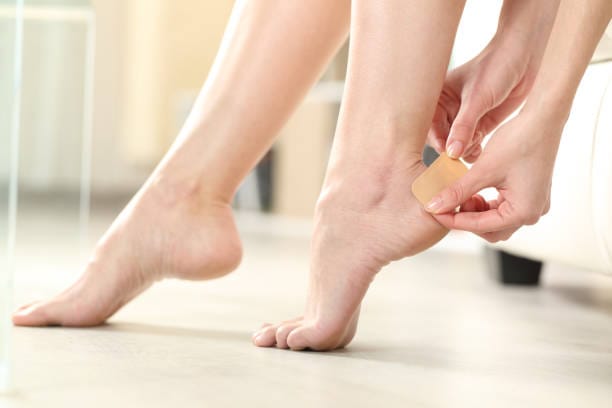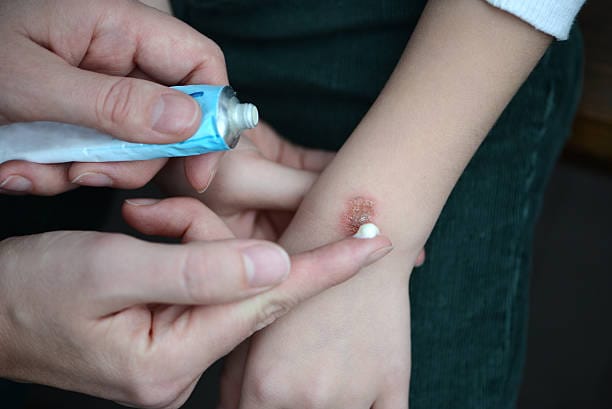
Plantar warts, also called verruca, are small rough growths that usually occur on the soles of the feet. While these warts are typically harmless, they can be quite painful and sometimes become ugly and embarrassing when they hang around or spread. Therefore, many individuals seek ways to deal with verruca in their homes before seeking professional treatment. The popularity of natural remedies and over-the-counter products is increasing, and people are looking for home verruca treatment options.
In this article, we will evaluate different treatment options for verruca, including home treatment solutions and medical options that can be done at home. We’ll discuss how the treatments work, whether they are likely to work, and the risks of treatment. At the end of this guide, you will better understand whether you should pursue home treatments or seek professional care.
What is a Verruca?
A verruca or plantar wart is a small growth that usually develops on the soles of the feet. Human papillomavirus (HPV) causes these warts and gets into the skin through the smallest cut. When the virus attacks, the skin makes more cells, creating a shiny, hard, raised dome that can be bumpy. Verruca often appears in areas that bear pressure, such as the ball of the foot or the heel, because pressure can make the wart grow deeper into the skin.
Verruca is highly contagious and can spread from person to person through direct contact or by walking barefoot in places such as swimming pools, gyms, and locker rooms. Warm and moist environments are ideal breeding grounds for the virus. In general, anyone can get verruca; however, people with a weakened immune system or frequent contact with public places are at a greater risk of developing it.
Although generally harmless, verruca can be annoying and uncomfortable, particularly when pressured. They can become persistent over time and won’t be relieved by natural or over-the-counter treatments. This happens, but many people look for other ways to manage the condition. Home verruca treatment is quite popular, as is going to a professional.
What is Home Verruca Treatment?
Home verruca treatment is another method for treating verruca without professional help at home. This is divided into two general treatment categories: natural remedies and medical-based treatments. Both aim to eliminate discomfort and the verruca. However, the effectiveness of each will depend on whether the verruca is persistent and what kind of treatment is used.

1. Natural Home Verruca Treatments
Natural remedies are the use of common substances or ingredients that are used for healing. These remedies are usually viewed as soft, inexpensive remedies for verruca. Some common natural treatments include:
- Due to its antiviral properties, apple cider vinegar is soaked with the verruca. Some say that acidity may help the wart tissue to break down.
- Garlic is used to treat verruca and the virus bonds with its natural antifungal properties. The wart is usually rubbed with crushed garlic several hours a day.
- Verruca can be treated with hot water and tea tree oil, particularly if the wart has darkened due to the keratin it has created. The oil can be applied directly to the wart.
- These natural remedies are easily available and cheap but don’t give immediate results. They require patience and can be of varying quality.
2. Medical-Based Home Verruca Treatments
Overall, the natural remedies are weaker than the medical treatments that are more appropriate for use in the home. Usually, these treatments work faster and are more effective for stubborn verruca. Popular medical-based home treatments include:
- Salicylic Acid is sometimes found in over-the-counter products, but it is also one of the most common treatments for verruca. It breaks down and softens the hard tissue in the wart until it peels away.
- Cryotherapy Kits: Other than freezing the verruca with liquid nitrogen, cryotherapy kits work the same at home. Usually, the freezing agent is applied to the wart, which falls off after several applications.
- Those medical treatments might be quicker but can sometimes lead to skin irritation and side effects if used incorrectly. Following these instructions precisely and consulting a professional if needed.
Natural Home Verruca Treatment Options
Many people who have to treat verruca at home as a first step will turn to natural remedies. Almost all of these remedies have easy-to-find, inexpensive ingredients and are supposed to have antiviral or antifungal properties. Natural treatments can be milder for the skin, but their effectiveness will differ, and results will take longer than medical treatments. Below are some natural home verruca treatments and so how they may help:
1. Apple Cider Vinegar
The remedy we are most familiar with regarding verrucas is a natural substance called Apple cider vinegar (ACV). ACV is believed to aid the acidity of doing away with wart tissue, allowing the body to eliminate it. You can use ACV (apple cider vinegar) by applying a little directly to the verruca with a cotton ball and covering it with a bandage. It should be left on overnight and repeated for several days or until it falls off. However, certain people may feel irritated or uncomfortable, and the skin should be checked for redness or excessive dryness.
Pros:
- Easy to use and inexpensive.
- It may help soften and break the wart tissue down over time.
Cons:
- Some results may take time (weeks).
- If not used carefully, it will irritate the skin.
2. Garlic
Although it’s well known to fight against viruses and fungi, some people will similarly consider garlic an effective treatment for verrucas. Crushed garlic may be applied to the verruca, as its active compounds may help fight the virus behind warts. Crush a garlic clove and apply it to the wart to use garlic for verruca treatment. Put a bandage on it and leave it over the night. Continue doing this day in and day out until the verruca vanishes.
Pros:
- Garlic is an excellent natural antiviral and antifungal agent.
- Easily accessible and inexpensive.
Cons:
- It may have a repugnant smell to some.
- It can irritate the skin if not taken off soon.
3. Tea Tree Oil
Other natural remedies include tea tree oil, known for its antiviral, antifungal, and antibacterial properties. It might help ward off the virus that causes verrucas or may help the healing process. To use tea tree oil, apply it directly to the verruca twice daily. Do not worry, though, that taking full doses of tea tree oil is not advisable, so the best thing is to dilute the tea tree oil with water (or other carrier oil) to avoid skin inflammation. And over time, tea tree oil may kill the wart and help dry the lesion out a bit.
Pros:
- Since they have antiviral and antifungal properties, they can target the HPV virus.
- The wart can be applied directly onto it and left overnight.
Cons:
- Not diluted properly may cause skin irritation.
- It takes time to show results.
4. Banana Peel
Enzymes and compounds inside a banana in banana peels help break down this wart tissue. Cut off a small peel and put the inside directly on your verruca. Secure the bandage and leave it on all night. According to some people, it is used regularly.
Pros:
- It is very easy to apply and gentle too on the skin.
- It can also be an okay, soothing, moisturising option for sensitive skin.
Cons:
- Results may take a long time.
- It has not been proven to be scientifically effective in removing verruca.
Natural remedies for treating home verruca are a convenient, cheap alternative for those trying to get rid of verruca. However, remember that results might vary, and some methods require less time than others. In cases where verrucas persist or become very severe, medical treatment or consulting a healthcare provider might be necessary.
Medical-Based Home Verruca Treatments
Apart from its natural remedies, medical-based treatments can also be utilised at home to treat verrucas. They are more potent and targeted, with faster and more reliable results. Most over-the-counter products will contain the same medical-grade ingredients that work effectively without side effects to treat the wart and will not require professional treatment. Some medical-based home verruca treatments are listed below:

1. Salicylic Acid Treatment
Verrucas are one of the most common conditions that can be treated by salicylic acid. This treatment is available in gels, ointments, and pads, which gradually soften and dissolve the wart tissue. Salicylic acid is regarded as a keratolytic agent, and as such, it breaks down the hard skin of the verruca to slough off over time. If you want this treatment, you just need to put the product on the affected area and cover it with a bandage. The dead skin takes several days to disappear, and you can remove it with a pumice stone or an emery board. At the same time, using it regularly for activity is very important.
Pros:
- Widely available over the counter.
- Relatively inexpensive.
- Effective for many people.
Cons:
- It is required for regular application (sometimes for several weeks).
- It can irritate the skin if not used enough or if used incorrectly.
2. Cryotherapy Kits
Medical treatment for removing the verruca is cryotherapy, which involves freezing the tissue so it dies. Like professional cryotherapy, over-the-counter cryotherapy kits use similar freezing agents, such as dimethyl ether or propane, to beat the wart. These kits are self-preventive and simple to use at home. The wand or applicator instantly uses the freezing agent on the verruca. The addition of freezing causes the wart tissue to die and flake off. Complete removal is needed for most people, and they have to repeat the treatment a few times.
Pros:
- Choice of fast treatment option.
- Effective for persistent verruca.
It can be done without a doctor’s appointment.
Cons:
- Some pain or discomfort can occur during this procedure.
- It may be associated with temporary redness or irritation.
Not suitable for sensitive skin or certain areas of the body
3. Caustic Solutions
They are strong chemical treatments, such as ones with potassium hydroxide or silver nitrate, which burn the wart away. These solutions work by chemically causing the tissue to cauterize the tendon, and eventually, the wart dies. These products are meant for use directly on the verruca (or in liquid form for application), and many are available. Still, caustic treatments must be used carefully because they can damage surrounding healthy skin if applied incorrectly.
Pros:
- It offers an aggressive format for cutting out warts.
- It is an effective way to use stubborn verruca.
Cons:
- It can also burn if not applied correctly.
- Surrounding skin may be damaged by strong chemicals.
It is very sensitive to application and can cause side effects.
4. Duct Tape Method
The duct tape method is sometimes considered a natural remedy, while others take a medical approach. Some people also use special wart removal adhesive pads. The pads suffocate the wart and cause it to fall off. Though less aggressive, some find this treatment works with other methods, such as cryotherapy or salicylic acid.
Pros:
- Simple and easy to use.
- There is no cause to be uncomfortable when worn continuously.
Cons:
- Results may vary, but it takes time.
- For larger or more persistent verruca, it may not be effective
When to Seek Professional Verruca Treatment
Home verruca treatment is effective in some cases, but a professional treatment is required in others. Verrucas that are not cured with at-home remedies may continue to hurt, persist, or spread to other areas of the skin. Your verruca might have developed larger or have become more painful if you haven’t found home treatment helpful, or if you’ve got the symptoms just on one leg or if you have diabetes.
1. Persistent Verruca
If you’ve been trying to treat the wart at home for weeks or months without modification, your wart may be persistent, and you may need superior treatment. However, if the verruca doesn’t go away after taking natural or over-the-counter medicines, professionals can use stronger forms of treatment, such as cryotherapy or laser treatment.
When to seek help:
- Several weeks of home treatment have failed to improve the verruca
- Anytime the Wart is gone, it will return.
- You become more in pain than before.
2. Multiple Verruca
There may be people with more than one verruca or wart, which can be difficult (unless you have lots of time) to treat several at once. In such situations, an expert will be in contact to offer treatment solutions that treat many warts simultaneously, faster and with superior results. Cryotherapy or laser treatments can remove several verrucas in a single session, and some therapy you can do at home will need to be completed individual fires to your warts.
When to seek help:
- You have several verrucae of the hand or feet.
- The warts are spreading quickly.
- It is difficult for you to treat them all at once.
3. Verruca on Sensitive Areas
Home treatments are safer for verrucas on other body parts but are not close to sensitive areas like the face, genitals, or nails. Medical professionals can treat these warts with care, and the surrounding skin is spared as the treatment works.
When to seek help:
- Irritation or Disease of the verruca is due to it being in a sensitive or difficult-to-reach area.
- You are not sure that it is safe to treat it at home.
4. Complicated Cases (Painful or Bleeding Warts)
It is important to see your doctor if the painful verruca starts to bleed or becomes contaminated. If Diseases or painful verrucas are left untreated, they could cause complications. If the patient is admitted, a healthcare provider can assess the situation and recommend an appropriate treatment plan, such as a minor Treatments procedure or stronger treatments.
When to seek help:
- Pain, swelling or bleeding from the wart is severe.
- If there is an Disease, you will see pus or increased redness.
5. Professional Treatments Available
Other treatments offered by the professionals include:
- Cryotherapy: Freezing the wart with liquid nitrogen to remove it.
- High-Intensity Laser Treatment: Using a high-intensity laser to destroy (laser treatment) the wart from the inside.
- ElectroProcedure removal: The wart is removed using an electric current.
If the warts continue, particularly when they have occurred for some time, a doctor may remove them by a simple Treatments procedure called Minor Procedure.
At-home treatments for minor vulvar are often effective, but there are circumstances in which they should be referred for professional treatment. If you’re struggling with painful, persistent or complicated warts, there is a professional solution that will give you faster and more reliable results.
Why Choose Revitalise London
Our mission is to fight several of the persistent verrucas at Revitalise London. Fueled by our team of expert clinical doctors who use advanced treatments like cryotherapy, laser therapy and electroProcedure for treated outcomes. However, we realise that every Verruca case is different, and we approach to meet the needs of each person. Our focus is on how patient-friendly you will be so that we can give you the professional space to have your treatment done in an efficient, safe, and effective environment. For those whose home treatments haven’t helped clear your skin, Revitalise London is here to help you have beautiful, clear skin! Book your consultation today.
